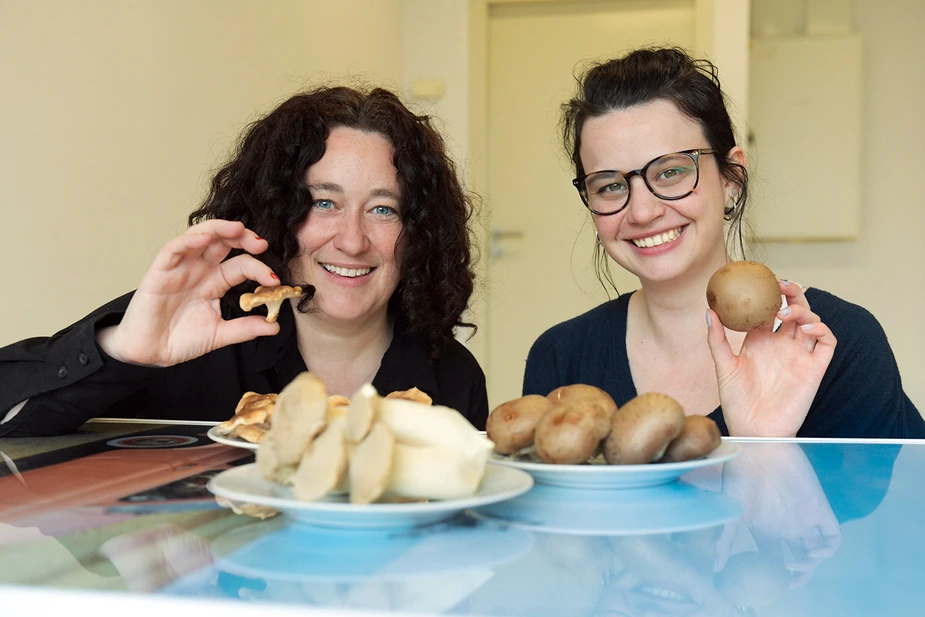Meatballs from the bioreactor
Mushlabs GmbH uses fungal cells for producing a vegan meat alternative
Fungi are highly efficient recyclers of plant waste, which they convert into proteins and other important nutrients. The young Hamburg-based company Mushlabs GmbH is developing a bioreactor process in which fungal cells transform waste from the food and agricultural industry into a high-quality base material for making vegan meat alternatives. An Adlershof-based offshoot from Mushlabs recently took up operations.
As a PhD biologist, Mazen Rizk wants to use his knowledge to solve the pressing problems of our planet. A meat-heavy diet is one of those problems. The production of one kilogram of beef, for example, requires 15,000 litres of water, 7 kg of grain, 30 square metres of farmland, and produces 25 kg of CO2 emissions. “The resource demand to feed mankind is reaching its natural limits”, he says. Based in Hamburg, where he works as a researcher, Rizk is doing his part to change that. To do so, he founded Mushlabs GmbH three years ago.
The start-up has since grown to 20 people and is expanding with a research and development (R&D) location in Adlershof. Equipped with a total of $13 million ( ̴ 11 million euros) in venture capital gained in two funding rounds, Mushlabs has developed a process by which waste from and agricultural production is transformed into a high-quality vegan food items. The key here are fungi – or, more precisely, the mycelia, i.e., the underground network of filaments that produces the fruiting bodies that we enjoy as edible mushrooms. The company’s team cultivates them in bioreactors by adding agricultural waste and leftover foods, which would otherwise be used to feed animals at best. “In our fermentation process, the mycelia also metabolise coffee grounds, sawdust, fruit peels from juicers, or bagasse from sugar factories, turning them into high-quality proteins, minerals, fibres, carbohydrates, and vitamins,” explains Rizk. The fungal cells are submerged in liquid during this feeding process. Once all the waste has been converted into the nutrient-rich roots, the mycelia are removed and processed to become either sausages, nuggets, or burger patties.
The bioreactors that are currently used are still laboratory-sized. The team is experimenting with many different types of fungi and waste materials to improve the precision with which they control the fermentation process. The founder won’t yet talk about how the ingredients affect taste and texture of the fungus-based meat alternative in greater detail: “We haven’t yet completed our patent application,” he explains. Based on the preliminary results, however, he is convinced that this is not a distant-future food solution. To up the fermentation process to an industrial scale, his team is currently having in-depth talks with potential partners from the food industry about using their existing production and sales infrastructure when starting out.
Until then, a team led by Catherine Chaput will continue working on optimising processes at their brand-new offices at Schwarzschildstrasse 6 in Adlershof. Chaput is responsible for setting up the Berlin-based R&D teams. “We are planning to grow our team to five people by the end of the year,” she says. There is plenty of work to do. Rather than creating yet another run-of-the-mill meat substitute, the team is bent on creating one that is as energy and resource efficient as any way possible. According to Rizk, the process is now already twice as efficient as when they started out. An exact balance sheet is underway. Since the founders are working with agricultural waste, high-capacity bioreactors, and highly efficient metabolites from the world of fungi, and not farmland, they do not have to fear the competition of resource-guzzling meat. The only thing left to do is to see how it tastes.
By Peter Trechow for Adlershof Journal
